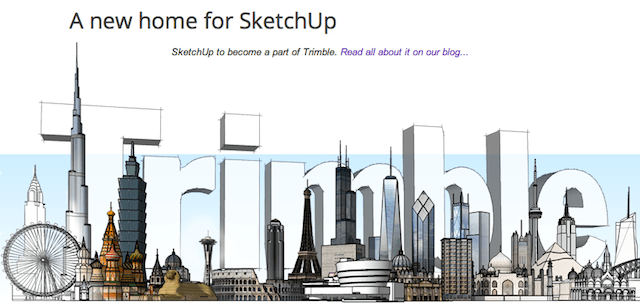Google's sale of a previously purchased arm of the company this morning, 3D modeling software SketchUp to Trimble, isn't just something it does "every now and again". It's actually Google's first divestment ever, according to two sources, and we're hearing the search giant made a profit, as it sold SketchUp for more than it bought it for back in 2006.
This could signal a sea change in how Larry Page executes his vision for a leaner, more focused Google. The company frequently shuts down extraneous products, but that requires redistribution of their team members internally. If it's now willing to sell them instead, Google could streamline around the theme of making user' lives more convenient, while making some money at the same time.
It wasn't that SketchUp wasn't working. It had 30 million activations since joining Google as part of @Last Software in March 2006. But it just didn't fit with the direction Google is heading in. It's a relatively niche product for architects and the construction industry, game developers, and film makers. It doesn't fit with last years theme of inherently social product that could be tied to Google+, or this years plan to simplify everyone's lives.
So rather than sink it in the deadpool, Google sold it to someone that can actually use — Trimble, a mapping, surveying, and navigation equipment company. Analysts speculated that Google paid $45 million for SketchUp in 2006. As Trimble called the acquisition of the product "immaterial", and therefore less than 5% of its annual revenue, it couldn't have paid more that $90 million for it. That would mean Google could have made up to $45 million in profit on the sale, though its likely closer to a few million.
Early this year Google shut down its photo editor Picnik and open sourced its Android stargazing app Google Sky Map. If the company had to do it again, maybe it'd sell them off instead.
This strategy of divesting successful but outlying products meshes with why we've heard Google didn't buy Instagram. While initially vaguely interested in buying the photo sharing service, we hear Google walked away before talks went past the coffee table stage. That's because buying Instagram for a high price just to fracture focus by running it independently didn't align with Page's game plan.
I often hear that headcount bloat and disorganization in the ballooning Google disgruntles employees and makes them flee for startups. The inefficient bureaucracy, lost transition time , and expensive counter-offers it has to make to get talent to stay are running up costs for Google while slowing it down. While no one wants to see their co-workers shipped out of the Googleplex, it may be wise for Google to sell the meat instead of just trimming the fat.
Update: Okay so it turns out Google's done this spin off thing once before, with Wideorbit. But for what it's worth that sale was "assets" and not a single product. So yeah*
[*Additional reporting by Alexia Tsosis and Rip Empson]
Google provides search and advertising services, which together aim to organize and monetize the world's information. In addition to its dominant search engine, it offers a plethora of online tools and platforms including: Gmail, Maps, YouTube, and Google+, the company's extension into the social space. Most of its Web-based products are free, funded by Google's highly integrated online advertising platforms AdWords and AdSense. Google promotes the idea that advertising should be highly targeted and relevant to users thus providing...
Trimble applies technology to make field and mobile workers in businesses and government significantly more productive. Solutions are focused on applications requiring position or locationâ€"including surveying, construction, agriculture, fleet and asset management, public safety and mapping. In addition to utilizing positioning technologies, such as GPS, lasers and optics, Trimble solutions may include software content specific to the needs of the user. Wireless technologies are utilized to deliver the solution to the user and to ensure a tight coupling of...
@Last Software is a 3D-design toolmaker and developer of the SketchUp software.

No hay comentarios:
Publicar un comentario